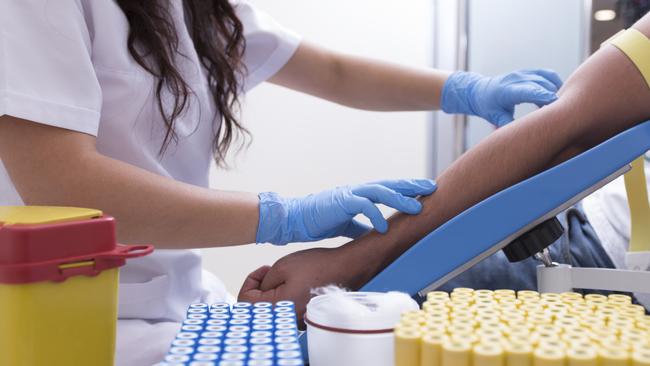Melbourne ‘liquid biopsy’ blood test breakthrough to be offered to patients
A BLOOD test that can detect if a cancer drug stops working months earlier than invasive checks will be offered to patients at multiple points during their treatment for the first time.

VIC News
Don't miss out on the headlines from VIC News. Followed categories will be added to My News.
A NEW blood test that can detect if a cancer drug has stopped working months earlier than standard invasive biopsies will be offered to patients.
The Melbourne breakthrough development of the “liquid biopsy” will give them regular reassurances about how their treatment is progressing, as well as allowing them to stop ineffective and expensive therapies earlier when they are likely to still have other options.
Tests involving more than 500 patients have confirmed the validity of using circulating tumour DNA — that shed by a cancer into the bloodstream — as a measure of disease progression.
BRUCE MCAVANEY REVEALS CANCER BATTLE
The Peter MacCallum Cancer Centre is now setting up an Australian-first service to offer ctDNA tests nationally by the middle of the year.
It may replace the need for painful and labour-intensive bone-marrow or tissue biopsies, while giving a more accurate snapshot of the cancer as it evolves.
The new service is the culmination of 10 years’ work by Associate Professor Sarah-Jane Dawson, who in collaboration with Professor Mark Dawson is now demonstrating ctDNA’s role in blood cancer.
“If you find out three months earlier a treatment is no longer working, you’re probably dealing with a cancer that is smaller and you may still have therapeutic options,” Associate Prof Dawson said.

In a series of studies into chronic lymphocytic leukaemia — published today in Nature Communications — and myelodysplasic syndromes — published in the journal Blood — Peter Mac researchers showed the tests were as accurate as bone-marrow biopsies and could also detect genetic changes crucial to the development of resistance.
A trial screening of 150 breast cancer patients for their ctDNA is already informing which patients should be prioritised to test new treatments.
The tests will be useful for assessing the effectiveness of new wonder drugs, such as venetoclax and ibrutinib, as this cannot be easily measured by traditional blood tests.
Lauren Mekis said a regular blood test to check the progress of treatment would have given her more peace of mind after she was diagnosed with Hodgkin’s lymphoma in 2015.
“Before starting treatment I had 70 injections, four scans, surgery to diagnose the cancer and a bone-marrow transplant,” the 26-year-old said. “But a blood test is simple.”


